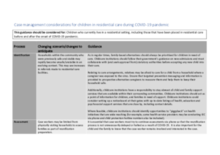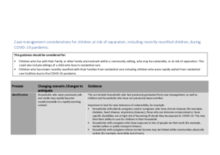Demographic Data
|
Sources: World Bank, UNDP, UNAIDS, DHS 2013 |
Displaying 4151 - 4160 of 14393
In this post from UNICEF Australia's blog, UNICEF Australia Program Manager for Early Childhood Development, Alice Hall describes some of the impacts of the COVID-19 pandemic on children, including the child protection implications.
Este documento presenta recomendaciones para garantizar que los procedimientos del mecanismo de prevención de la institucionalización continúen siendo efectivos o, en algunos casos, se fortalezcan durante la pandemia de la COVID-19.
Esta guía debe considerarse para: niños, niñas y adolescentes que actualmente viven en un entorno de protección residencial, lo cual incluye a aquellos que han sido colocados antes y después del inicio de la pandemia de COVID-19.
Esta guía debe considerarse para los niños, niñas y adolescentes que viven con su familia que puede estar en una situación de vulnerabilidad o estar en riesgo de separación y también los niños, niñas o adolescentes que se han reunificado recientemente con sus familias, incluidos aquellos(as) que salieron rápidamente del cuidado residencial debido a la pandemia de la COVID-19.
This webinar focuses on standard 16 from the 2019 edition of the CPMS - strengthening family and caregiving environments - in the context of the current global COVID-19 pandemic.
The tips in this guidance should be considered to ensure gatekeeping procedures continue to remain effective or in some cases are strengthened during the COVID-19 pandemic.
This guidance should be considered for children who currently live in a residential setting, including those that have been placed in residential care before and after the onset of COVID-19 pandemic.
This guidance should be considered for children who live with their family or other family environment within a community setting, who may be vulnerable, or at-risk of separation, as well as children who have been recently reunified with their families from residential care.
The Christian Alliance for Orphans (CAFO) is administering a survey to learn more from you about what is and is not working. The aim is to learn and share from your experience, understanding that what works for one program may work for another.
"A new study predicts that demand for foster care is likely to rise during the coronavirus pandemic, as households struggle with the economic impacts of bans and restrictions," says this article from SBS News.






